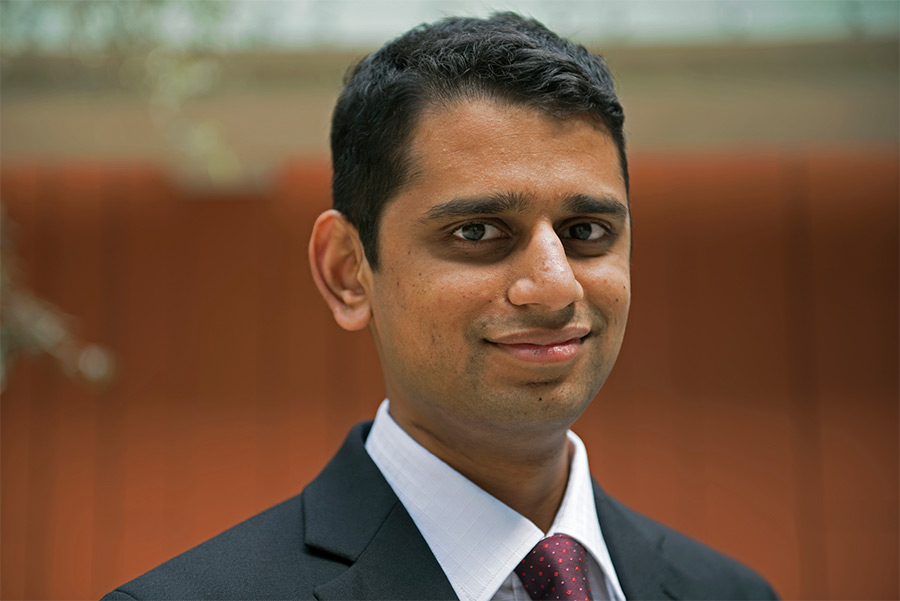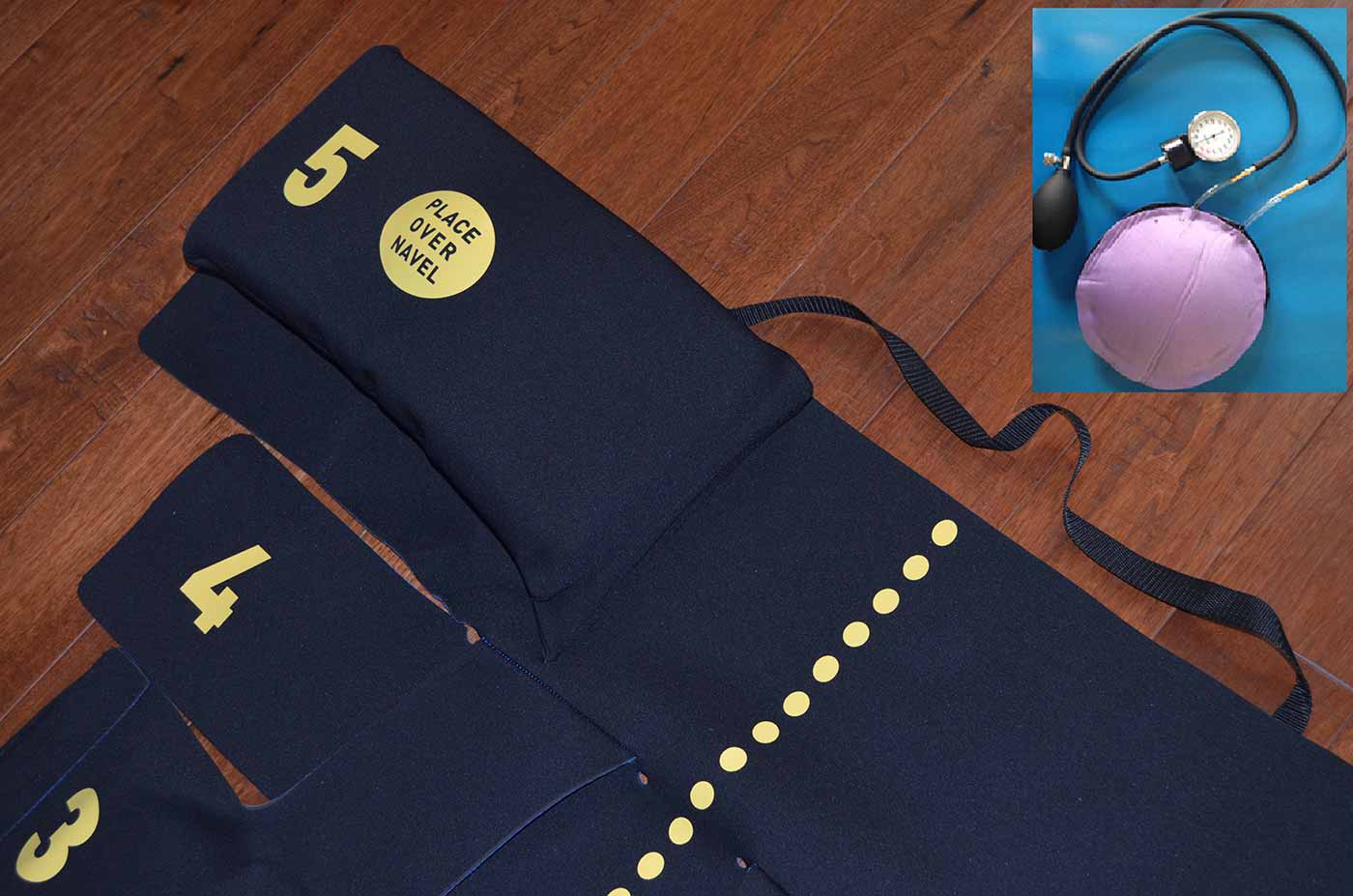
By:
- Christine Clark
Published Date
By:
- Christine Clark
Share This:
Student Social Innovators Take Center Stage at 2016 Clinton Global Initiative University
UC San Diego team advances to the finals in this year’s CGI U Commitments Challenge

Sandeep Prabhu, a student at UC San Diego’s School of Medicine, lived in South India as a child where he witnessed firsthand the issues communities face when they have poor access to health care. His desire to help such communities inspired Prabhu to study medicine and spearhead an initiative that aims to save the lives of thousands of women who give birth outside institutional settings and often die en route to a clinic due to excessive blood loss.
The initiative, Saving Sara, was formed around a medical device that Prabhu helped develop to reduce maternal deaths due to postpartum hemorrhage (PPH). “Of the tens of thousands of women who die from PPH every year, 99 percent lived in the developing world,” Prabhu said. “And if I can do something to reduce that number, then I have a moral obligation to do so. That is what continues to drive me with this work.”
Prabhu will be representing Saving Sara at this year’s Clinton Global Initiative University (CGI U), a meeting where thousands of students, university representatives, topic experts and celebrities come together to discuss and develop innovative solutions to pressing global challenges. Prabhu is one of 42 UC San Diego students who will be attending CGI U, hosted by President Bill Clinton and his daughter, Chelsea Clinton, April 1 to 3 at UC Berkeley. This is the highest number of students representing UC San Diego since the campus played host to CGI U in 2011.
As part of the conference, students develop commitments to action—new, specific and measurable initiatives that address global challenges across CGI U’s five focus areas: education, environment and climate change, peace and human rights, poverty alleviation and public health. UC San Diego’s students will be presenting 18 commitments that address several of these pressing issues.
All of the UC San Diego teams attending CGI U have the opportunity to present their commitments to action at the meeting. Some, such as Prabhu, also opt to participate in the CGI U Commitments Challenge, a competition in which students race to raise the most money for their respective projects. On Tuesday, it was announced that Prabhu is leading one of the four teams that have advanced to the finals. The teams that raise the most money for their commitments to action each round will advance to the next. Participating teams keep all funds raised throughout the Commitments Challenge and all donations go directly to participating students. The winner will be announced April 2. The public can donate to their favorite CGI U 2016 commitment at www.cgiu.org/challenge.
“Social innovation and public service are rich traditions at UC San Diego,” said Chancellor Pradeep K. Khosla. “Students committed to service are vital to UC San Diego’s excellence, and they are a testament to our campus’s ranking as the number one university for contributions to the public good by Washington Monthly for the sixth consecutive year.”

Vice Chancellor for Student Affairs Juan González added, “We are pleased to have so many students attend CGI U this year. It is an ideal conference for our students, as it is designed to be a place where participants do more than simply discuss problems; they take concrete steps to solve them by creating action plans, building relationships, participating in hands-on workshops, and following up with CGI U as they complete their projects.”
Saving Sara: Uniting mothers and children in a battle against postpartum hemorrhage (PPH)
For Prabhu, who earned an undergraduate degree in bioengineering at UC Berkeley and a master’s degree in bioengineering at UCLA, CGI U is an important next step in making his goals of reducing postpartum hemorrhage a reality. PPH is the leading cause of maternal mortality worldwide and kills nearly 80,000 women every year in the developing world.
“I have been working on the project that forms my commitment at CGI U for nearly three and a half years,” he said. “This is a philanthropically minded project with its main goal to save lives.”
According to Prabhu, any woman who delivers her baby outside a hospital or clinic will need to be transported to a better equipped health facility if she starts bleeding uncontrollably after childbirth, as it can result in a rapid and painful death. Many women in developing countries deliver in such circumstances and are stabilized during transport using the first-aid device called the non-pneumatic anti-shock garment, or NASG, which slows blood loss by applying pressure on the woman’s abdomen and legs.
The NASG's lack of pressure detection capability, however, hinders its efficacy, Prabhu said.
“To combat this, my colleague and I developed a pressure sensor device that specifically optimizes NASG use. My goal, which I hope CGI U will help me achieve, is to mass produce this device I helped develop and make it available in settings where the NASG is currently used. I hope to do this through collaboration with NGO partners and/or national governments.”
Saving Sara, which earned its name by being an acronym of first names of the four students’ names (Sandeep, Alisha, Rebecca, Atri or SARA) who were part of the project at the beginning, is just one way Prabhu gives back. He also worked at the UC San Diego student-run free clinic that provides care to numerous uninsured persons in and around San Diego. In addition, he founded the UC San Diego Making Medicine Equal conference that aims to raise awareness about different forms or health inequities and disparities through a one day event that brings together an interdisciplinary group of health professions students and experts in the field.
“My desire to serve is what brought me to medical school and drives my work,” he said. “My work at Saving Sara represents a means of serving women all over the developing world, many of whom suffer from poor access to health and innumerable problems.”
In addition to Saving Sara, commitments from other UC San Diego students range from supplying clean, easily accessible drinking water for a rural community in India to providing new and rapid HIV testing to meet the needs of high-risk populations along the U.S./Mexico border, among others.
New and rapid HIV testing to meet the needs of high-risk populations along the U.S./Mexico border
Elaine Skowronski , a fourth year nanoengineering doctoral candidate, is also passionate about providing health care to underserved communities—which is why she will be attending CGI U this year to represent her commitment, a Novel Rapid HIV Test for U.S./Mexico Border Community. The commitment is designed to meet the needs of high-risk populations along the U.S./Mexico border, delivering critical health information to individuals directly in the communities where they live and work.
“HIV/AIDS is a major health concern along the U.S.-Mexico border,” Skowronski said. “The border city of Tijuana, in Baja California, has a ‘micro-hyperepidemic’ of HIV/AIDS. Although Tijuana offers free HIV testing through Mexican government-funded clinics, these clinics are located far from many of the communities that are hardest hit by infection. Individuals simply cannot afford the travel time to get tested and to return to receive results. A real need exists for accurate, mobile testing of HIV infection.”
She added, “Our group at UC San Diego has developed a prototype handheld device for rapid disease testing that uses just a drop of blood from a finger stick and yields results in less than an hour. The test does not require blood to be drawn from a vein by a trained professional (doctor, nurse or phlebotomist), which represents cost savings and increased distribution in the community.”
Skowronski says that for this project, she and her team were able to draw upon their successful previous work designing tests for monitoring the activity of enzymes associated with diabetes, physiological shock, and blood disorders. The rapid HIV test can detect HIV by measuring the activity of an enzyme necessary for viral replication that indicates infection.
Following clinical validation, her colleagues plan to make the testing available to communities along the border through existing an infrastructure that UC San Diego already has in place with the bi-national student-run community free clinic known as Health Frontiers in Tijuana, which was established in Tijuana’s Zona Norte.
“This project would not be possible if it wasn’t for the interdisciplinary culture at UC San Diego in which engineers, physicians and others come together to develop solutions to help patients all over the world,” she said. “I am grateful that I can interact with doctors, patients, research clinicians, nurses and medical students at UC San Diego, so that my engineering projects take on a greater meaning.”
For more information on UC San Diego student’s CGI U 2016 commitments, click here.
Share This:
You May Also Like
Stay in the Know
Keep up with all the latest from UC San Diego. Subscribe to the newsletter today.


